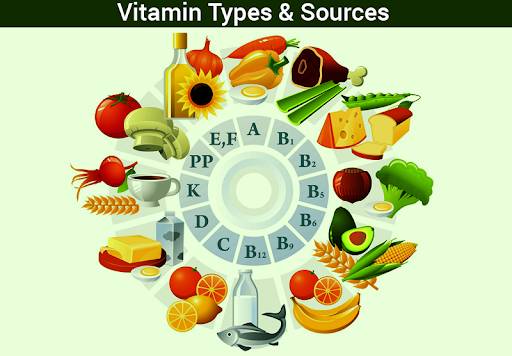What are vitamins, and how do they work?
Vitamins are chemical compounds that humans require in trace amounts. The majority of vitamins must be obtained from food since the body either does not make them or generates just a little amount.
Vitamin needs varies depending on the organism. Humans, for example, require vitamin C from their meals, but dogs can manufacture their own entire vitamin C.
Vitamin D is not present in sufficient levels in diet for humans. When exposed to sunshine, the human body produces vitamin D, and this is the finest source of vitamin D. Vitamins serve a variety of functions in the body, and each individual requires a different quantity of each vitamin to be healthy.
What are vitamins?
Vitamins are organic compounds that can be found in small amounts in natural diets. Inadequate quantities of any vitamin can increase the risk of developing certain health issues. Vitamins are organic compounds, meaning they include carbon. It’s also an important vitamin that the body need from diet. There are now 13 vitamins that have been identified.
Vitamins that are fat-soluble and water-soluble:
In fat or water, vitamins are either soluble or dissolvable. Both kinds are described below:

Fat-soluble vitamins:
Fat-soluble vitamins include A, D, E, and K. Vitamins that are fat-soluble are stored in fatty tissue and the liver, and their stores can persist for days, if not months, in the body. Dietary fats aid in the absorption of fat-soluble vitamins in the intestine.
Water-soluble vitamins:
Water-soluble vitamins don’t last very long in the body and can’t be stored. They are expelled from the body through the urine. As a result, humans require more water-soluble vitamins than fat-soluble vitamins on a daily basis. Vitamin C, as well as all of the B vitamins, are water-soluble.
Vitamins Functions and Sources:

Vitamin A:
It contributes to the formation and maintenance of healthy teeth, bones, soft tissues, mucous membranes, and skin.
Source:
Animal sources (retinol):
- Fortified milk
- Cheese
- Cream
- Butter
- Fortified margarine
- Eggs and Liver
Plant sources (Beta-carotene):
- Leafy
- Dark green vegetables
- Dark orange fruits (apricots, musk melon)
- Vegetables (carrots, winter squash, sweet potatoes, pumpkin)
Vitamin B1:
It facilitates the conversion of carbs into energy in the bodily cells. It’s critical to consume the proper quantity of carbs throughout pregnancy and nursing. It is also necessary for a healthy heart and nerve cells to operate properly.
Source:
- Pork
- whole-grain foods
- enriched bread
- cereals
- legumes
- Nuts and seeds
Vitamin B2:
It functions in conjunction with the other B vitamins. It is required for bodily growth as well as the formation of red blood cells.
Source:
- Asparagus
- bananas
- persimmons
- okra
- chard
- cottage cheese
- milk
- yoghurt
- beef
- Eggs
- fish
- Green beans are examples of these foods.
Vitamin B3:
It’s a B vitamin that keeps your skin and nerves in good shape. It is widely known for its ability to reduce cholesterol at large dosages.
Source:
- Chicken
- beef
- tuna
- salmon
- milk
- eggs
- tomatoes
- leafy vegetables
- broccoli
- carrots
- nuts and seeds
- tofu
- lentils
Vitamin B5:
It’s needed for the production of energy and hormones.
Source:
- These include meats
- whole grains
- broccoli
- avocados
- yogurt
Vitamin B6:
It is necessary for red blood cell production.
Source:
- Chickpeas
- beef liver
- bananas
- squash
- nuts
Vitamin B7:
It makes it possible for the body to digest proteins, lipids, and carbs. It also helps to make keratin, which is a structural protein found in the skin, hair, and nails.
Source:
- Egg yolk
- liver
- broccoli
- spinach
- cheese
Vitamin B9:
It is required for the production of DNA and RNA. This can damage the neurological system of the child in the womb. Before and throughout pregnancy, doctors advise taking folic acid supplements.
Source:
- Green leafy vegetables
- peas
- lentils
- liver
- fortified grains and beans,
- Sunflower seeds are all good sources of iron.
- Also, several fruits have moderate amounts.
Also rea: https://techypot.com/improving-your-memory/
Vitamin B12:
It is necessary for the nervous system to function properly. Low amounts might cause neurological issues and anaemia in certain people.
Source:
- Fish,
- shellfish,
- meat,
- poultry,
- eggs,
- milk and other dairy products,
- fortified cereals,
- fortified soy products,
- Fortified nutritional yeast.
Vitamin C:
It helps in the creation of collagen, wound healing, and bone growth. It also serves as an antioxidant and strengthens blood vessels. It also boosts the immune system, aids iron absorption, and strengthens blood vessels.
Source:
- Fresh Fruit and vegetables with out coocking.
Vitamin D:
It is required for the mineralization of bone in a healthy manner. This can lead to rickets and osteomalacia, or bone softening.
Source:
- Exposure to UVB rays from the sun or other sources causes the body to produce vitamin D.
- The vitamin can also be found in fatty fish, eggs, beef liver, and mushrooms.
Vitamin E:
Its antioxidant action aids in the prevention of oxidative stress, which raises the danger of widespread inflammation and illness. Although this is an uncommon occurrence, it can cause hemolytic anemia in infants. This disease causes the death of blood cells.
Source:
- Wheat germ
- kiwis
- almonds
- eggs
- nuts
- leafy greens
- vegetable oils
Vitamin K:
It aids in the clotting of blood. Low levels can lead to an extraordinary sensitivity to bleeding, often known as bleeding diathesis.
Source:
- Natto
- leafy greens
- pumpkins
- figs
- parsley
